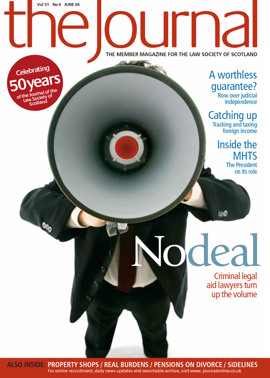The talking stops here

The Glasgow Bar Association decision to refuse instructions in sexual offence cases as from 1 August opens a new front in the row between the solicitors’ profession and the Scottish Executive over legal aid.
The previous week, the Society’s Council adopted without opposition the motion approved at the requisitioned Special General Meeting, calling on the Society “to withdraw all co-operation in criminal matters from the Scottish Executive and Scottish Legal Aid Board”.
While the Society’s declared first move is to write to the Scottish Parliament’s Justice 1 Committee, asking it to reopen its 2001 report recommending at that time that fees for criminal work should rise, and it has expressly disavowed co-ordinating any action by individual solicitors, it is sympathetic towards local initiatives taken within the law.
Following the Special General Meeting, one firm sought clarification of its position from Drumsheugh Gardens before letting Scottish Legal Aid Board inspectors into the office. Oliver Adair, convener of the Legal Aid Solicitors Committee which is leading the Society’s campaign, insists that solicitors must still abide by their professional obligations: “The Society will ensure that any action taken, organised by the Society means that solicitors will continue to meet their legal obligations and duties under any statutory codes of conduct.”
Morale boost
The SGM, as Council members recognised, came as a great boost to the morale of the hard-pressed legal aid practitioner. “I have seldom attended a meeting that displayed such strong feelings or unity of purpose”, Adair commented. “We now have a motivated, committed, united group of practitioners who believe the Society can do something for them.” In adopting the motion, Council was clear that it should accept the spirit of the SGM, and highlight the breach of faith by the Executive as much as the inadequate rates now being paid.
“I’m delighted that Council adopted the motion without opposition, and I look forward to moving the issue forward and very much hope that the Deputy Justice Minister will arrange a meeting as quickly as possible to resolve the issue”, Oliver Adair told the Journal. Asked whether the Society’s action was likely to have much impact on the Executive, he responded: “We’re commencing by writing to Justice 1 to ask them to revisit the issue, since their report in 2001 was the starting point for this discussion. Our hope is that that is all we will require to do and that Mr Henry will meet with us and we can discuss the issue.”
Though Adair declined to disclose the Society’s strategy or tactics in advance, apart from confirming that its action will not extend to its law reform work or other co-operation with the Scottish Parliament, he added: “I think there are a variety of steps we can take both within the legal system and the political system, and we will consider these as and when it becomes appropriate.”
To the Executive’s reaction to the SGM, that negotiations were the best way forward, he replied: “I agree, and I look forward to receiving the phone call to set the meeting.”
The apparent meeting of minds is not all that it seems, as earlier the same month Mr Henry pulled out of a scheduled meeting with the Society to discuss the interim increase offered, suggesting his officials could handle the matter. Both at the SGM and at Council strong feelings were expressed that the Executive is treating solicitors with contempt and the very independence of the profession is now under threat.
Glasgow steps further
Such sentiments were clearly in evidence at the Glasgow Bar Association meeting. Speaking afterwards, President Gerry McClay said: “The meeting agreed unanimously to refuse instructions in sexual offence cases commencing on or after 1 August 2006. This step was taken due to the Executive’s failure to implement the revised payment structure, which is integral to the reform of the justice system.”
Since those accused of sex offences are not permitted to represent themselves, the move is a carefully targeted one to put the Executive on the spot. In the short term the Crown could decide to release more accused on bail – with obvious potential for unwelcome media headlines – but pressure of time limits will fairly quickly bring matters to a head. Last year there were over 900 such cases in Scotland.
McClay predicted that other local faculties are likely to follow Glasgow’s lead.
For the Society Oliver Adair said he “understands the frustration which has led them to take such action. However we are pleased that they have delayed the action to 1 August to allow negotiations to continue”.
The Executive in response repeated its statement that an interim offer was on the table and the way forward was through negotiation.
In this issue
- Independence first
- Stand up for our system
- The talking stops here
- The bill: a half measure
- Turning up the heat
- Strengthened or threatened?
- The patient approach
- Another little job
- The wars of the portals
- The LLP factor
- Avoiding surprises
- The temporary judge survives
- HMRC to the rescue
- Core of the agreement
- A debate to be resumed
- The impact of human rights
- Website reviews
- Book reviews
- Is that burden dead yet?






